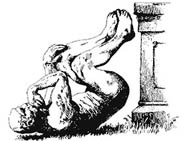 column_buckwolf
column_buckwolf
Kooky Scientists Get Last Laugh
Ig Nobel Winners Can't Be Ig-nored

The paper airplanes will fly Thursday at Harvard University, when this year's Ig Nobel winners journey from four continents to accept this dubious distinction. (Annals of Improbable Research)
By BUCK WOLF
Oct. 4, 2005 —
Cure polio and you win the Nobel Prize; invent a washing machine for dogs and you win the Ig Nobel – the most laughable award in academia. But remember, being just a joke at Harvard can sometimes be lucrative.You'd think being called before an audience of real Nobel winners and Harvard University students (many in Groucho glasses) who throw paper airplanes at you and laugh at your work, would be enough to crush any career.
Still, over the years, many winners of the Ig Nobel – a joking answer to the Nobel Prize – have turned their wacky inventions into big bucks, while other honorees continue as respected scientists.
Before self-perfuming suits hit stores in South Korea, and before Beano became recognized as a leading treatment for flatulence, the inventors of these products earned Ig Nobel honors.
"Our winners make you laugh – but they also make you think," says Marc Abrahams, chief organizer of the event and author of "The Ig Nobel Prizes 2" (Dutton).
Time has indeed vindicated great innovators who were initially dismissed as crackpots. But even the ones who never get that recognition come to Harvard to see their research lampooned and collect their trophy – each one handcrafted and "made of exceedingly cheap material designed to fall apart within four weeks."
"We're not insulted," said Jonathan Wyatt, part of a team of Scottish researchers who delivered their 2000 Ig Nobel-winning paper, "The Collapse of Toilets in Glasgow."
"Between us, we've published more than 70 research papers. This is the only one that's given us any publicity at all."
Eduardo Segura of Spain took his share of ribbing in 2002, when he rolled out his side-loading machine to wash pets. Pooches could be automatically sprayed with water, shampooed and – unlike a lost sock – they wouldn't go astray in the dryer.
But now, at Colorado's Pet World pet spa in Lakewood, animal lovers are bringing their furry friends in for a 37-nozzle machine wash, all done with natural cleaning ingredients and over in a four-minute shake.
Other Ig Nobel winners may yet make history. The Spinning Birthing Table – a device that promised to reduce labor pains through centrifugal force – never made it into production. But perhaps one day it might be in vogue for expectant mothers to strap themselves into a spinning apparatus, so that they can just pop out their children, and go dizzily into motherhood.
With the 15th Ig Nobel ceremony this Thursday, the Wolf Files catches up with some prominent past winners, all of whom have continued their scholarly pursuits.
1. Money Talks for Doggie Translation Device
Do you know what your dog would say if he could speak? "Don't knock drinking from the toilet. You don't know what you're missing."
Many animal experts still have their doubts about Bowlingual – a device that translates your dog's "woofs," "arfs" and "aroos" into phrases like "I'm lonely" and "How boring; Let's Play!" Still, when inventors accepted their 2002 Ig Nobel, they detailed how animal behaviorists devoted years of research to make human-to-dog communication a reality.
One thing is certain: Bowlingual has translated into big bucks. Manufacturer Takara has now sold more than 300,000 doggie translators. And at $70 a pop, not one consumer has complained that their furry friend, once connected to this device, has woofed out, "What a sucker!"
Bowlingual became such a hit that in 2003, the Japanese prime minister gave two prototypes to Russian leader Vladimir Putin – one for each of his dogs. Takara subsequently developed a translation device for cats, raising the hope that dogs and cats will one day open a dialogue and resolve their differences.
2. Political Momentum for India's Association of Dead People
By forming India's Association of Dead People, Ig Nobel winner Lal Bihari started a political movement that won the support of 3,400 voters in the 2003 election. That's barely a blip on India's political radar, but it's astounding considering that Bihari and many of his followers had died long ago (at least according to government records).
Bihari learned that he was officially dead in 1976, when he was rejected for a bank loan and a clerk showed him his own death certificate. Thus began an 18-year struggle to get India's bureaucracy to bring him back to life.











